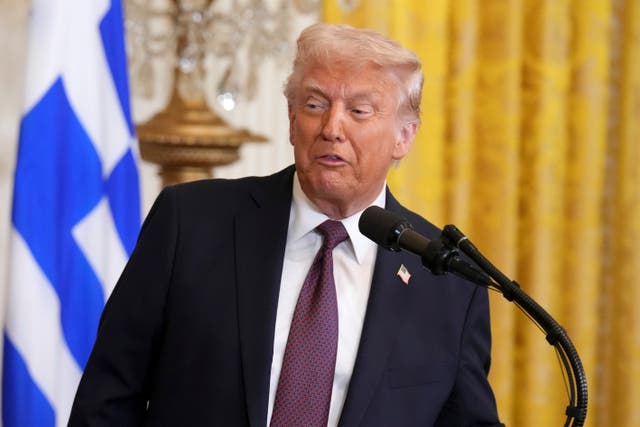Trump officials texted war plans to group chat that included journalist
The National Security Council said it was looking into how a journalist’s number was added to the chain in the Signal group chat.

Top national security officials for US President Donald Trump, including his defence secretary, texted war plans for upcoming military strikes in Yemen to a group chat in a secure messaging app that included the editor-in-chief for The Atlantic, the magazine reported.
The National Security Council said the text chain “appears to be authentic”.
It was not immediately clear if the specifics of the military operation were classified, but they often are and at the least are kept secure to protect service members and operational security.
The US has conducted air strikes against the Houthis since the militant group began targeting commercial and military vessels in the Red Sea in November 2023.
Just two hours after Mr Goldberg received the details of the attack on March 15, the US began launching a series of air strikes against Houthi targets in Yemen.
The National Security Council said in a statement that it was looking into how a journalist’s number was added to the chain in the Signal group chat, which included Tulsi Gabbard, Mr Trump’s director of national intelligence, and secretary of state Marco Rubio.
Mr Goldberg said he received the Signal invitation from Mike Waltz, Mr Trump’s national security adviser, who was also in the group chat.
In a statement late on Monday, White House spokeswoman Karoline Leavitt said the president still has the “utmost confidence” in Mr Waltz and the national security team.
Mr Trump told reporters he was not aware of the apparent breach in protocol.
“I know nothing about it,” Mr Trump said, adding that The Atlantic was “not much of a magazine”.
He went on to say: “I don’t know anything about it. You’re telling me about it for the first time.”
Government officials have used Signal for organisational correspondence, but it is not classified and can be hacked.
The sharing of sensitive information comes as defence secretary Pete Hegseth’s office has just announced a crackdown on leaks of sensitive information, including the potential use of polygraphs on defence personnel to determine how reporters have received information.
Sean Parnell, a spokesman for Mr Hegseth, did not immediately respond to requests for comment on why the defence secretary posted war operational plans on an unclassified app.
The breach in protocol was swiftly condemned by Democratic legislators.
Senate Democratic leader Chuck Schumer called for a full investigation.
“This is one of the most stunning breaches of military intelligence I have read about in a very, very long time,” Mr Schumer, a New York Democrat, said in a floor speech on Monday afternoon.
“If true, this story represents one of the most egregious failures of operational security and common sense I have ever seen,” said Senator Jack Reed of Rhode Island, the top Democrat on the Senate Armed Services Committee, in a statement.
He said American lives are “on the line. The carelessness shown by Trump’s Cabinet is stunning and dangerous. I will be seeking answers from the Administration immediately”.
Mr Himes said if a lower-ranking official “did what is described here, they would likely lose their clearance and be subject to criminal investigation. The American people deserve answers”, which he said he planned to get at Wednesday’s previously scheduled committee hearing.
Senate Majority Leader John Thune said he wants to learn more about what happened.
“Obviously, we got to run it to the ground, figure out what went on there,” said Mr Thune, a South Dakota Republican.
The handling of national defence information is strictly governed by law under the century-old Espionage Act, including provisions that make it a crime to remove such information from its “proper place of custody” even through an act of gross negligence.
The Justice Department in 2015 and 2016 investigated whether former secretary of state Hillary Clinton broke the law by communicating about classified information with her aides on a private email server she set up, though the FBI ultimately recommended against charges and none were brought.

The official said Signal was most commonly used to communicate what they internally referred to as “tippers” to notify someone when they were away from the office or travelling overseas that they should check their “high side” inbox for a classified message.
The app was sometimes also used by officials during the Biden administration to communicate about scheduling of sensitive meetings or classified phone calls when they were outside the office, the official said.
The use of Signal became more prevalent during the last year of the Biden administration after federal law enforcement officials warned that China and Iran were hacking the White House as well as officials in the first Trump administration, according to the official.
The official was unaware of top Biden administration officials – such as vice president Kamala Harris, defence secretary Lloyd Austin and national security adviser Jake Sullivan – using Signal to discuss sensitive plans as the Trump administration officials did.
Some of the toughest criticism targeted Mr Hegseth, a former Fox News Channel weekend host.
Senator Tammy Duckworth, an Iraq War veteran, said on social media that Mr Hegseth, “the most unqualified Secretary of Defense in history, is demonstrating his incompetence by literally leaking classified war plans in the group chat”.





